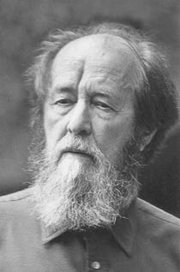Kevin MacDonald: Alexandr Solzhenitsyn’s important 200 Years Together has unfortunately not been translated into English. However, this process is now beginning with the posting of Chapter 20, “In the Camps of GULag.” As the title suggests, the chapter discusses the role of Jews in the Gulag. There are several important themes.
Despite apologetic claims by Jews, in fact Jews lived better in the camps. Obviously, it’s a touchy subject–just like everything else about the role of Jews in the Soviet Union.
If I wished to generalize and state that the life of Jews in camps was especially difficult, then I would be allowed to do so and wouldn’t be peppered with admonitions for unjust ethnic generalizations. But in the camps, where I was imprisoned, it was the other way around – the life of Jews, to the extent of possible generalization, was easier.
Jews also looked out for each other–yet another example of ethnic networking. Free Jews were often in positions of authority and they favored their own people. For example:
A Lett Ane Bernstein, one of my witnesses from Archipelago, thinks that he managed to survive in the camps only because in times of hardship he asked Jews for help and that the Jews, judging by his last name and nimble manners, mistook him for their tribesman – and always provided assistance. He says that in all his camps Jews always constituted the upper crust and that the most important free employees were also Jews (Shulman – head of special department, Greenberg – head of camp station, Kegels – chief mechanic of the factory), and, according to his recollections, they also preferred to select Jewish inmates to staff their units.
The few Jews who did share in the common labor did so out of principle–in order to avoid the stereotype of Jews who did not work. They were rewarded for their efforts by being rejected by “both sides” — indicating that everyone in the camps was aware of the ethnic divide–just as American prisons are organized along ethnic fault lines. But Solzhenitsyn optimistically describes Jews who countered the common tendencies: “I try not to overlook such examples, because all my hopes depend on them.”
Nevertheless, the resentment and hatred of the Jewish position in the camps was real. Solzhenitsyn realizes that all humans are prone to these tendencies, but he also understands that the ethnic divide exacerbated the “heavy resentment”:
When an alien emerges as a “master over life and death” – it further adds to the heavy resentment. It might appear strange – isn’t it all the same for a worthless negligible, crushed, and doomed camp dweller surviving at one of his dying stages – isn’t it all the same who exactly seized the power inside the camp and celebrates crow’s picnics over his trench-grave? As it turns out – it is not, it has etched into my memory inerasably.
The Russians did not show ethnic networking and accordingly suffered. Notice that he sees the mass murder involved in collectivization as a personal loss to his ethnic group.
Those who know about terrific Jewish mutual supportiveness (especially exacerbated by mass deaths of Jews under Hitler) would understand that a free Jewish boss simply could not indifferently watch Jewish prisoners flounder in starvation and die – and not to help. But I am unable to imagine a free Russian employee who would save and promote his fellow Russian prisoners to the privileged positions only because of their nationality, though we have lost 15 millions during collectivization: we are numerous, you can’t care about everyone, and nobody would even think about it.
The White Sea Canal, completed in 1933, has gone down in history as a particularly brutal forced labor project in which thousands of workers died. Solzhenitsyn points out that all six of the people in charge of the project were Jews:
Genrikh Yagoda, head of NKVD.
Matvei Berman, head of GULag.
Semen Firin, commander of BelBaltlag (by that time he was already the commander of Dmitlag, where the story will later repeat itself).
Lazar Kogan, head of construction (later he will serve the same function at Volgocanal).
Jacob Rapoport, deputy head of construction.
Naftaly Frenkel, chief manager of the labor force of Belomorstroi (and the evil daemon of the whole Archipelago)
Solzhenitsyn’s observations fit well with the findings of historians like Yuri Slezkine showing that Jews were a political and cultural elite in the Soviet Union. Slezkine draws special attention to Jews as Stalin’s “willing executioners” supervising the greatest crimes of the 20th century.
Throughout the chapter Solzhenitsyn’s brutal honesty shines through. He bends over backward to give examples of Jews who behaved in ways contrary to the general tendencies he and others observed. Nevertheless, he recounts how he was often accused of anti-Semitism simply for recording his observations. It’s okay to depict an evil person as a Russian, but never identify him as a Jew.
Solzhenitsyn’s observations add to the growing evidence of the role of Jews as a hostile elite in the USSR–hostile to the native Russian population and willing to engage in the most brutal crimes against them. This translation is very important for bringing this message to the English-speaking world, if only to dispel the common representation of Jews as always and inevitably historical victims.
White Americans should think long and hard about what these observations imply for them as they become a minority in a country dominated by hostile minorities, including Jews as a hostile elite.
